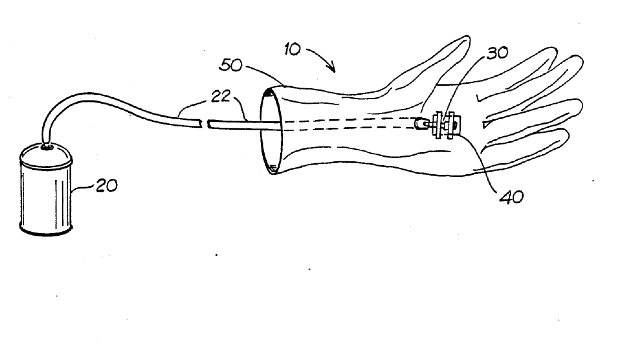 Tucsonan Stephen Kimble's drawing for his Spider-Man 'web-shooter' toy, patented in 1990.
Tucsonan Stephen Kimble's drawing for his Spider-Man 'web-shooter' toy, patented in 1990.A Tucsonan lost his appeal to the U.S. Supreme Court Monday to have royalty payments extended for a Spider-Man "web-shooter" toy he invented 25 years ago.
Stephen Kimble, a lawyer, sued Marvel Enterprises to keep 3 percent royalty payments coming from Marvel's sale of the web-shooter toy after the patent expired in 2010.
The court ruled 6-3 in Kimble vs. Marvel Entertainment that the patent law is clear that royalties need not be paid past expiration of the patent based on the patent law and a prior court ruling.
Kimble said he was disappointed, noting that the justices in their ruling suggested Congress could change the law.
"It is more important that the rule of law be settled than it be settled right," he said. "And to me it's like, wow, that hurts. They are almost saying whether it's right or it is not right, it's not up for us to decide. It's up to Congress to decide."
Kimble invented the toy in 1990 and applied for a patent. Before the patent was granted, he went to Marvel, which passed up using the invention. The company later marketed its own version of the toy, and Kimble sued, winning a judgment of contract violation.
In settlement, Marvel paid Kimble for the patent and agreed to a 3 percent royalty payment on net sales. An appeals court ruling in the case said Marvel paid Kimble more than $6 million in royalties over the years.
But the two parties went to court again over disagreements on royalty calculations and other matters. Kimble took the case through a series of appeals, losing every step of the way. That included Monday's Supreme Court decision.
In her opinion for the majority, Justice Elena Kagan quoted from a 1962 Spider-Man comic: "In this world, with great power there must also come - great responsibility." With that, she wrote, it was responsible of the court to stay with the patent law and case-law precedent.



By submitting your comments, you hereby give AZPM the right to post your comments and potentially use them in any other form of media operated by this institution.